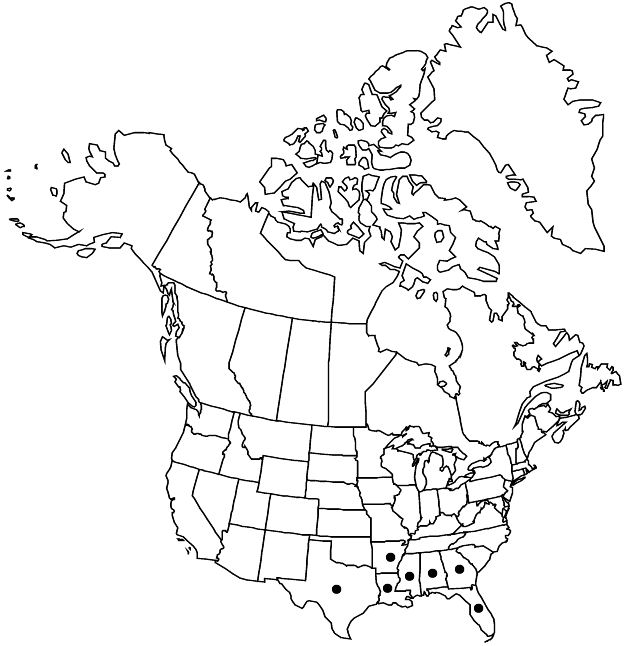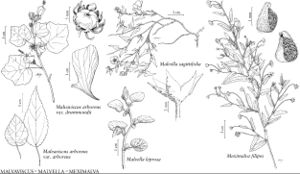Difference between revisions of "Malvaviscus arboreus var. drummondii"
Ann. Missouri Bot. Gard. 29: 215. 1942.
FNA>Volume Importer |
imported>Volume Importer |
||
| (6 intermediate revisions by 2 users not shown) | |||
| Line 10: | Line 10: | ||
|special_status={{Treatment/ID/Special_status | |special_status={{Treatment/ID/Special_status | ||
|code=F | |code=F | ||
| − | |label= | + | |label=Illustrated |
}} | }} | ||
| − | |basionyms={{Treatment/ID/ | + | |basionyms={{Treatment/ID/Basionym |
|name=Malvaviscus drummondii | |name=Malvaviscus drummondii | ||
|authority=Torrey & A. Gray | |authority=Torrey & A. Gray | ||
| + | |rank=species | ||
| + | |publication_title=Fl. N. Amer. | ||
| + | |publication_place=1: 230. 1838 | ||
}} | }} | ||
|synonyms={{Treatment/ID/Synonym | |synonyms={{Treatment/ID/Synonym | ||
|name=Pavonia drummondii | |name=Pavonia drummondii | ||
|authority=Torrey & A. Gray | |authority=Torrey & A. Gray | ||
| + | |rank=species | ||
}} | }} | ||
|hierarchy=Malvaceae;Malvaceae subfam. Malvoideae;Malvaviscus;Malvaviscus arboreus;Malvaviscus arboreus var. drummondii | |hierarchy=Malvaceae;Malvaceae subfam. Malvoideae;Malvaviscus;Malvaviscus arboreus;Malvaviscus arboreus var. drummondii | ||
| Line 34: | Line 38: | ||
|elevation=0–200 m | |elevation=0–200 m | ||
|distribution=Ala.;Ark.;Fla.;Ga.;La.;Miss.;Tex.;Mexico (Coahuila;Tamaulipas). | |distribution=Ala.;Ark.;Fla.;Ga.;La.;Miss.;Tex.;Mexico (Coahuila;Tamaulipas). | ||
| − | |discussion=<p>It is questionable whether var. drummondii is native to states east of Texas. The remarkably uniform populations that grow in central Texas suggest that the variety is native there. The taxon apparently was, early on, taken into cultivation in coastal southeastern United States, where it has escaped and persisted. Variety drummondii is also grown in California, North Carolina, and South Carolina but has not naturalized.</p> | + | |discussion=<p>It is questionable whether <i></i>var.<i> drummondii</i> is native to states east of Texas. The remarkably uniform populations that grow in central Texas suggest that the variety is native there. The taxon apparently was, early on, taken into cultivation in coastal southeastern United States, where it has escaped and persisted. Variety drummondii is also grown in California, North Carolina, and South Carolina but has not naturalized.</p> |
|tables= | |tables= | ||
|references= | |references= | ||
| Line 43: | Line 47: | ||
-->{{#Taxon: | -->{{#Taxon: | ||
name=Malvaviscus arboreus var. drummondii | name=Malvaviscus arboreus var. drummondii | ||
| − | |||
|authority=(Torrey & A. Gray) Schery | |authority=(Torrey & A. Gray) Schery | ||
|rank=variety | |rank=variety | ||
| Line 57: | Line 60: | ||
|publication title=Ann. Missouri Bot. Gard. | |publication title=Ann. Missouri Bot. Gard. | ||
|publication year=1942 | |publication year=1942 | ||
| − | |special status= | + | |special status=Illustrated |
| − | |source xml=https:// | + | |source xml=https://bitbucket.org/aafc-mbb/fna-data-curation/src/2e0870ddd59836b60bcf96646a41e87ea5a5943a/coarse_grained_fna_xml/V6/V6_544.xml |
|subfamily=Malvaceae subfam. Malvoideae | |subfamily=Malvaceae subfam. Malvoideae | ||
|genus=Malvaviscus | |genus=Malvaviscus | ||
Latest revision as of 22:21, 5 November 2020
Plants clone-forming, 0.5–1.5(–3) m, softly hairy. Stems glabrous proximally, densely and minutely tomentose distally. Leaf blades deeply 3-lobed, broadly ovate, 4–9 × 4–12 cm, at least as long as wide, base usually strongly cordate, margins crenate-dentate, apex obtuse (acute). Petals 1.5–3.5 cm. 2n = 28.
Phenology: Flowering summer–fall.
Habitat: Limestone slopes and ledges, wooded arroyos, along streams in shaded areas
Elevation: 0–200 m
Distribution

Ala., Ark., Fla., Ga., La., Miss., Tex., Mexico (Coahuila, Tamaulipas).
Discussion
It is questionable whether var. drummondii is native to states east of Texas. The remarkably uniform populations that grow in central Texas suggest that the variety is native there. The taxon apparently was, early on, taken into cultivation in coastal southeastern United States, where it has escaped and persisted. Variety drummondii is also grown in California, North Carolina, and South Carolina but has not naturalized.
Selected References
None.
